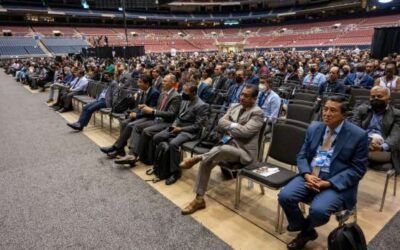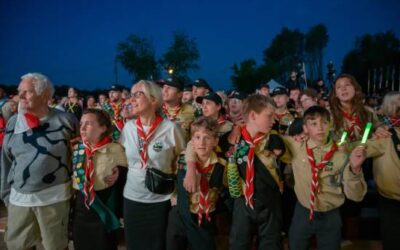Friday rolls around, and you’re spending time with your friends or relatives when they mention they’re going to vespers this evening.
They said the word so nonchalantly. Maybe that made you feel like you should know what it means. Maybe that’s what brought you here now.
Vespers comes from the Latin vesper, meaning “evening star,” and vespera, meaning “evening.” Today it refers to an evening prayer time, or “evensong” in Roman Catholic, Orthodox, Lutheran, and Anglican churches. It could take place any evening and usually happens around sundown, involving prayer, celebration, thanksgiving, or praise of God.
As we’ll see next, Adventists are more specific when they use the word.
Vespers for Adventists is a special time of worshiping God to begin or end the Sabbath. It can range from a quiet time of Bible reading to a casual home gathering, or even a formal worship service.
We’ll dive into the specifics of vespers and why it’s so important to Seventh-day Adventists. You’ll learn:
- The meaning of vespers
- Why Adventists hold vespers
- What happens during vespers
- Where to find a vespers program
Let’s start with what the word itself means.
What does “vespers” mean for Adventists?

Photo by Douglas Bagg on Unsplash
When Adventists talk about vespers, they’re referring to a time of informal worship or formal liturgy that either begins the Sabbath or ends the Sabbath—Friday night vespers (the most common) or Sabbath night vespers.
They celebrate it at sundown because the biblical Sabbath runs from sunset to sunset. In our clock-controlled world, we begin our days at midnight. But in biblical times, the new day began with the setting of the sun.
This goes back to Creation.
Each day of the Creation week concluded with the words “there was evening and there was morning, the [first, second, third, etc.] day” (Genesis 1:31 NKJV). After the evening and morning of the sixth day, God rested on the seventh day and set it apart as holy (Genesis 2:1–3). This 24-hour period is the same Sabbath that we welcome during vespers.
Why do Adventists participate in vespers?
Friday evening vespers, beginning at sunset, celebrates the start of the seventh day, the Sabbath—a day to set apart from the rush of life and focus on our relationships with God and with other people. Vespers serves as the boundary between day-to-day busyness and the Sabbath.
Here’s how.
Hurry permeates our lives. So many people have demanding jobs, or work overtime. To add to that, we often rush from there to pick the kids up from school to take them to sports practices. And don’t forget cooking meals for a hungry family and folding the laundry that’s been on the couch for days!
With all the busyness, it can be hard to slow down and transition our minds onto God.
But vespers paves the way for that transition. We praise and thank God for His guidance and help through the past week. And then, we turn our attention to God and the people around us so that we can be fully present in the blessings of the Sabbath.
At the same time, vespers connects us with like-minded people who want to draw closer to Jesus.
And as Sabbath ends on Saturday evening, we once again pause, this time to thank God for the blessings of the Sabbath and ask for His strength in the new week. We transition out of the Sabbath and back into the day-to-day, refreshed and bringing God’s presence with us.
Who can attend vespers?
Vespers is for anyone! Even if you don’t keep the Sabbath, you can enjoy the activities of a vespers service. Adventists are an inclusive bunch, so we’ll welcome you with open arms, whether you want to participate or just observe.
What happens during vespers?
Vespers can involve a variety of worship-related activities. Some vespers services, particularly those on Adventist college or academy campuses, can be like miniature church services or concerts. But others take place in people’s homes with simple traditions—lighting candles, eating a special meal, singing certain songs, or sharing blessings from the past week.
And note: Vespers doesn’t have to happen with other people. Sometimes, a person may prefer to spend a quiet Friday evening reading the Bible, taking a walk while praying, or listening to music. Or a family may use Friday evening as a way to bond with one another instead of being with a large group.
Regardless of the exact circumstances, here are some possible vespers activities:
- Prayer
- Music
- Bible study
- Testimonies
Prayer
One person might pray to begin and end vespers. Or the vespers could be structured like a prayer meeting, where people share prayer requests and pray together in pairs or small groups.
Music
Many Adventists sing hymns or praise songs to welcome the Sabbath. Some may pull out their instruments, too.
Two common vespers songs from the Seventh-day Adventist Hymnal are “Day Is Dying in the West” and “Abide with Me.” The hymnal also has a section of songs about the Sabbath with “Don’t Forget the Sabbath” and “Safely Through Another Week” being the most popular.
Bible study
In a family or home setting, this could be as simple as reading a Bible passage, devotional, or story and discussing it. Some may host a small group Bible study for vespers, too.
In a more formal program, an individual might share a short message or sermon.
Testimonies
Sometimes, a vespers program can be a testimony service, where people have the opportunity to share how God is working in their lives. Or even what they’re thankful for or lessons they’ve learned.
Where to find a vespers program
Vespers programs are held in numerous places: churches, Adventist college and high school campuses, people’s homes, or out in nature. They can even happen over ZOOM and livestream. To find a vespers program near you, contact your local Seventh-day Adventist Church. Their websites’ calendars and Facebook pages can help you, too.

Photo by Helena Lopes on Unsplash
Experience the joy of the Sabbath through vespers
Vespers is a special part of Adventist Sabbath-keeping. Throughout the week, we look forward to this time, and when Sabbath ends, we ride on its strength into the new week.
But it’s more than just a tradition.
It boils down to relationships—vespers allows us to connect with Jesus on a deeper level and foster a sense of community.
So, why not attend a vespers program yourself? It could be just the experience you’ve been looking for.
Find a Church
If you’re interested in finding a local Adventist church near you, you can use the Adventist Locator provided by the General Conference of Seventh-day Adventists.
Related Articles
More Answers
Do Seventh-Day Adventists Have “Rules” For Clothing?
Many religions have guidelines on dress, but what about the Adventist Church? Discover how Adventists choose to dress based on biblical principles.
11 Reasons People Become Seventh-day Adventists
Curious why many people become Adventists? Here are elements of Adventist beliefs, values, and mission often reflected in people’s decisions to join.
What’s the Seventh-day Adventist General Conference Session?
At the General Conference Session, Adventist delegates from around the world gather to assess the state of the organization, pray, and discuss current issues. Here’s how it works.
How Adventists View the End of the World
The end of the world is no fun to think about. But here’s how we can actually find hope and comfort in what’s to come.
What Is an Adventist Medical Missionary?
A medical missionary in the Adventist Church is someone who cares for the medical needs of people as a way of showing the love of Jesus. They may travel to another country, or even just serve in their hometown.
Is the Seventh-day Adventist Church Protestant?
Learn how the beliefs of the Seventh-day Adventist Church align with the “5 solas” of Protestantism.
Are Seventh-day Adventists Evangelicals?
According to its origins and definition, evangelicalism is about following Jesus and the Bible and sharing the Gospel through the way we live our lives. Adventists wholeheartedly harmonize with these principles.
Could Anything Keep Me from Becoming an Adventist?
We are each saved through Christ. But when it comes to church membership, are there certain beliefs or expectations to become an Adventist?
Do Seventh-day Adventists Have “Rules”?
We uphold principles we believe will help us maintain a closer relationship with Jesus and His Word. Learn how these principles guide Adventist lifestyles.
Do Seventh-day Adventists Have “Rules” For Marriage?
Around the world, many cultures and religions have various marriage traditions, expectations, or even rules when it comes to choosing a partner, planning the wedding, extended family logistics, or a number of other things.
Can a Seventh-day Adventist Marry a Non-Adventist?
Yes. Seventh-day Adventists are not under any official rules that dictate who they can or cannot marry. This is a personal, life-altering decision between the couple and God.
What Adventists Believe About Alcohol and Tobacco Use
The Seventh-day Adventist Church has historically discouraged the use of alcohol and tobacco. Even before the church started in 1863, its leaders were realizing the negative effects of these substances.
Jewelry—Why Do Many Seventh-day Adventists Choose Not to Wear It?
If you walk into a Seventh-day Adventist church service, you might notice that many people aren’t wearing earrings, bracelets, necklaces, or sometimes even wedding rings.
International Pathfinder Camporee
Youth aged 10-15 in the Adventist Church’s global Pathfinder program look forward to the International Camporee every 5 years. This event brings together Pathfinders from around the world for exciting activities.
How Adventists interpret Bible prophecy
Bible prophecy conjures up a variety of emotions in people. For some, it feels exciting or mysterious.
Moviegoers’ Guide to The Hopeful: The Facts Behind the Film
Learn where and when you can watch The Hopeful and how to get tickets. Already seen it? We’ll uncover the real story that inspired this film.
How Are Seventh-day Adventists Different from Other Protestants?
As a Protestant Christian denomination, the Seventh-day Adventist Church regards the Bible as the ultimate guide and looks to Jesus Christ as the only way to salvation. We do have some differences of belief or interpretation when it comes to topics like Bible prophecy, end-time events, the Sabbath, and a person’s state after death.
How Adventists Handle Death and Funerals
Most Seventh-day Adventist funeral services are similar to those of other Protestant denominations, such as Methodists, Baptists, or Presbyterians, but you might find a few differences or unique nuances.
Adventist Culture
Many Seventh-day Adventists adhere to specific lifestyle principles that can make them stand out from those in other Christian denominations. Whether it’s going to church services on Saturday or eating the popular Adventist entrée of “haystacks.”
Do Adventists Observe Easter-Related Holidays?
Jesus Christ’s resurrection, celebrated on many Easter-related holidays, is central to the beliefs of the Seventh-day Adventist Church. And that means we seek every opportunity to remember it.
An Overview of Seventh-day Adventist Higher Education
The Seventh-day Adventist Church has about 118 tertiary schools around the world. Though many of them are within North America, you’ll also find Adventist universities in countries across the world—places like Croatia, Austria, Brazil, Madagascar, and the Philippines.
The Ten Commandments from a Seventh-day Adventist Perspective
Ever eaten a salad and gotten a big piece of green stuck in your teeth? And you didn’t realize it was there until you looked in the mirror? (Because no one ever told you!)
The Benefits of A Seventh-day Adventist Academy
Adventist academies are high schools (grades 9-12) that are owned and operated by the Seventh-day Adventist Church.
Are Seventh-day Adventists Christians?
Yes, the Seventh-day Adventist Church is a Protestant Christian denomination formed in 1863. Just like other Christians, we believe that Jesus Christ is our Savior and seek to follow the principles of the Word of God.
Adventist Movies: Where Faith and Film Meet
The Adventist Church uses film to share our faith and uplift positive values. Learn more about specific Adventist-produced films and where to find them.
Do Adventists Celebrate Christmas?
In general, most Seventh-day Adventists do celebrate Christmas.
Since our denomination doesn’t have specific guidelines about holidays, it’s up to each member to decide whether to celebrate it based on their personal convictions and study of the Bible.
What Does the Bible Say About Modesty
Seventh-day Adventists and Christians in general try to ensure their outward presentation and lifestyle glorify God. This often involves daily habits like the ways we hold conversations, the ways we dress and accessorize, and the ways we regard other people when we’re out and about.
How Do Adventists Make Movie and Music Choices?
How do Adventists decide what music to listen to and which movies to watch? Learn how Bible principles can help us make better entertainment choices.
Does the Seventh-day Adventist Church Believe in Paying Tithe?
Seventh-day Adventists believe in paying tithe and offerings based on the biblical command and our commitment to being wise stewards of God’s resources. These donations help fund the mission of the Adventist Church by supporting pastors, missionaries, church expenses, and evangelistic projects, among other things.
Didn’t find your answer? Ask us!
We understand your concern of having questions but not knowing who to ask—we’ve felt it ourselves. When you’re ready to learn more about Adventists, send us a question! We know a thing or two about Adventists.































